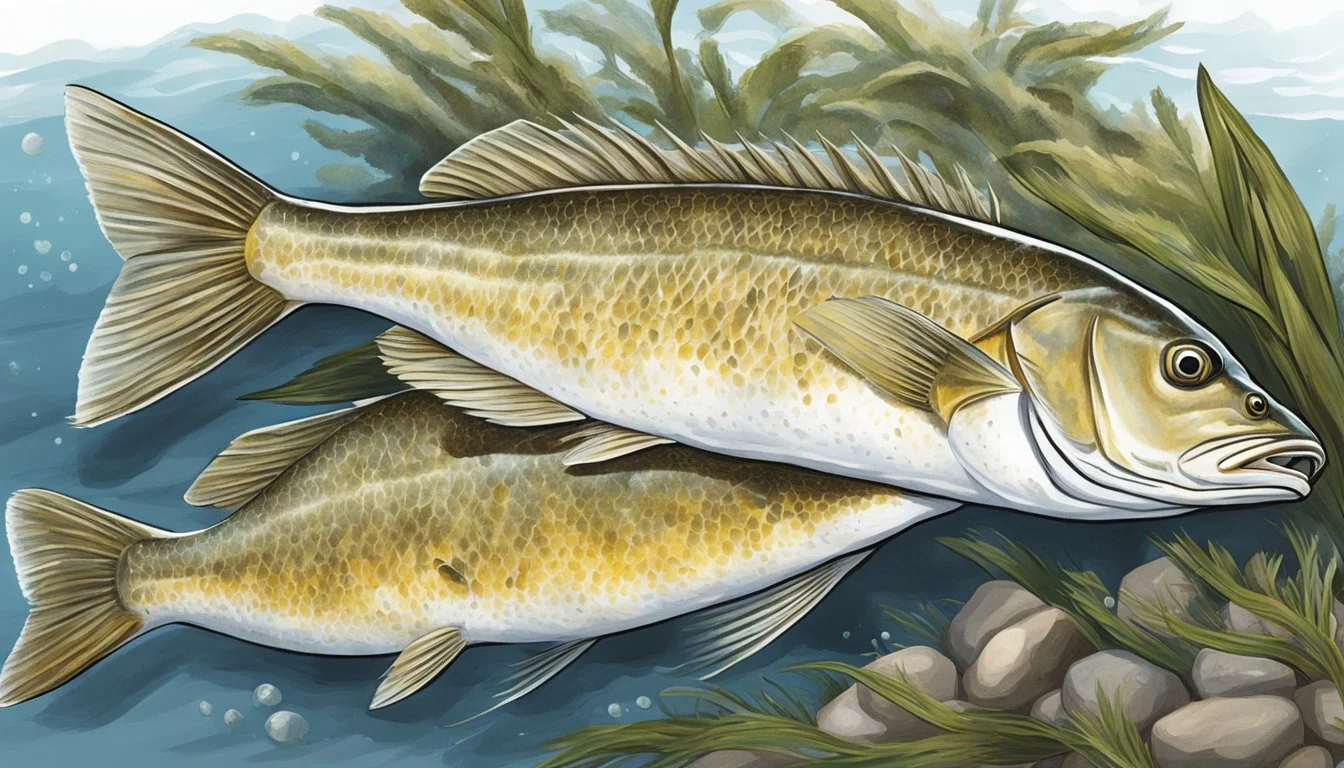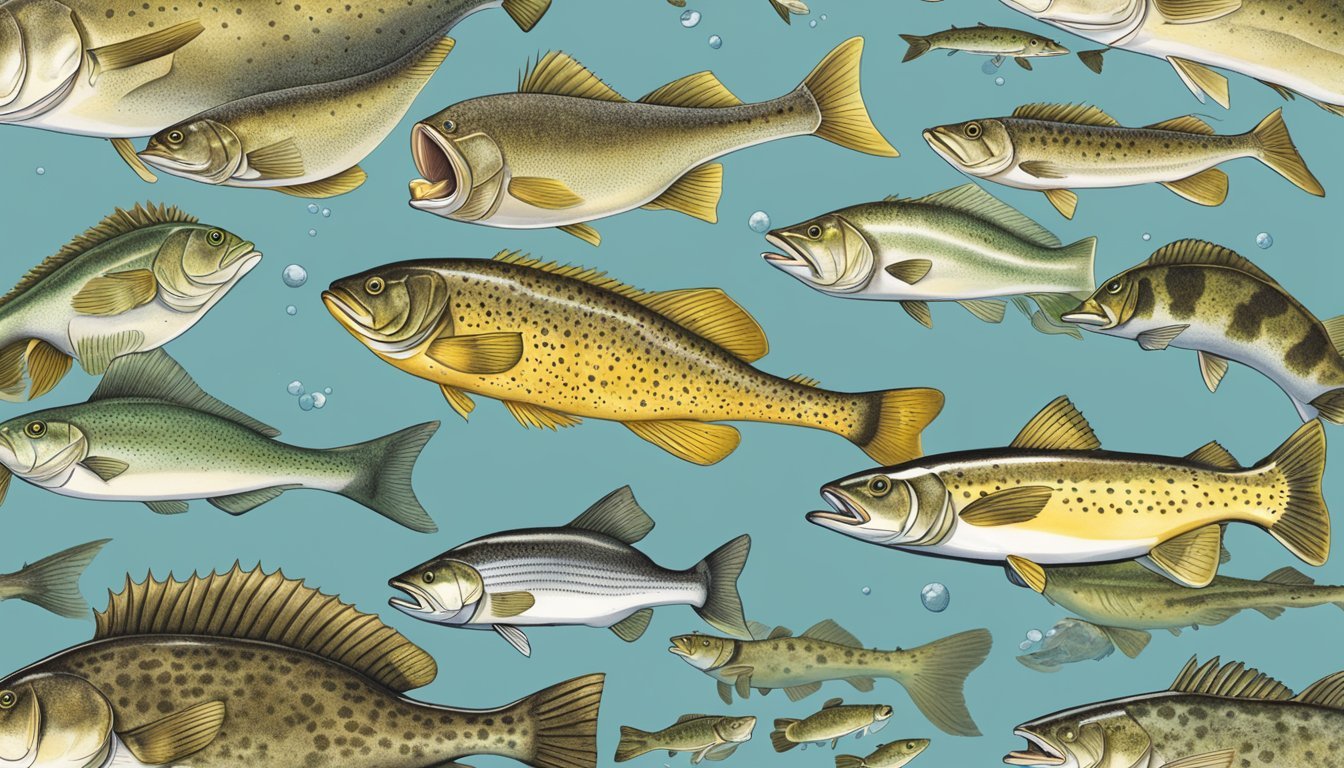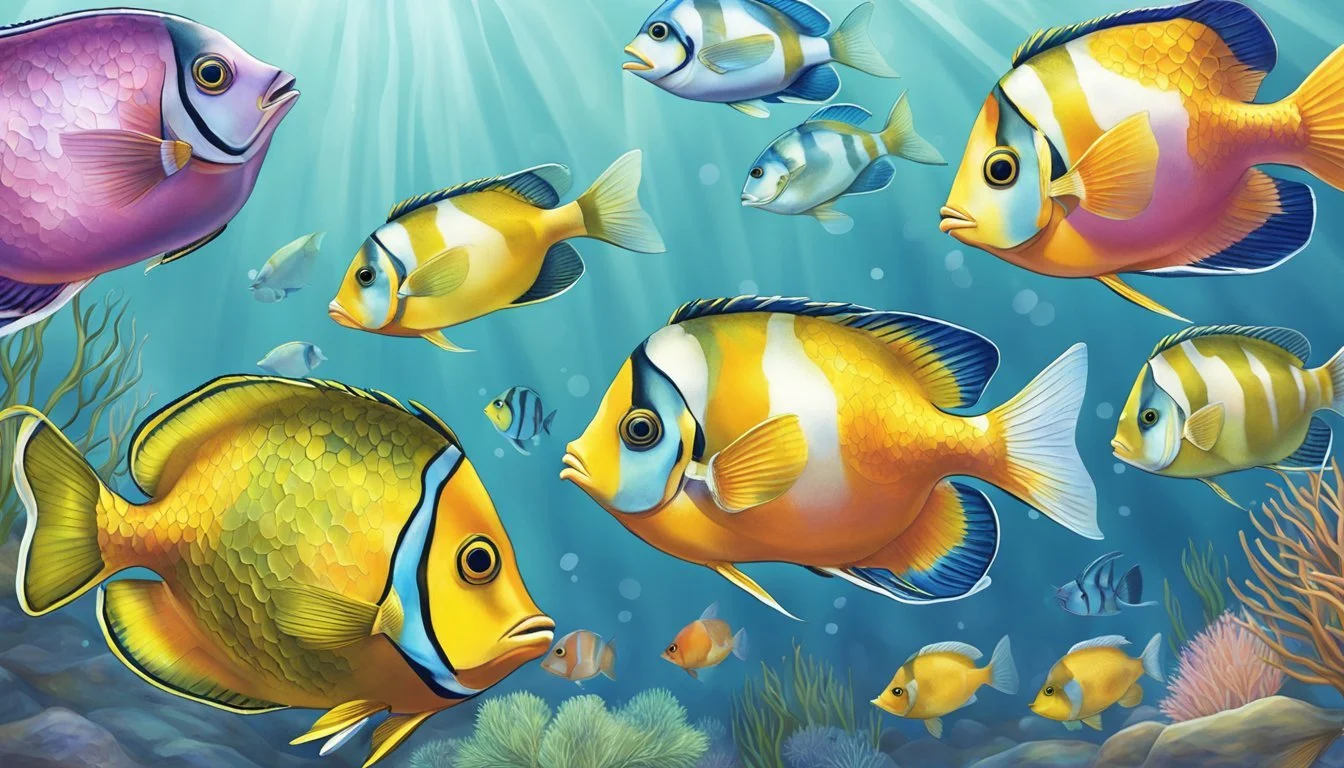Best Fish to Catch and Eat in North Carolina
Your Tasty Guide
North Carolina offers a rich variety of fish (What wine goes well with fish?) species that make both fishing and eating a delightful experience. With an extensive network of rivers, lakes, and a generous coastline, the state is a haven for anglers and seafood enthusiasts alike. From the mountainous western streams where freshwater fish such as trout thrive to the warm, coastal waters of the Atlantic, North Carolina's diverse aquatic environments are home to an array of sought-after fish.
Anglers in North Carolina can expect to reel in species such as rock bass, catfish, and the ever-popular striped bass, or they might set their sights on bluegill and perch. In coastal regions, fishing for cobia is not only an exciting challenge due to their size and strength but also rewarding for their flavor, earning them the nickname "lemonfish." Meanwhile, the state's many freshwater sources, like the Roanoke and Neuse rivers, are brimming with bass varieties, walleye, and crappie, making it easier for fishermen to find their next catch.
The state's favorable conditions have even led to record-breaking catches such as the heavyweight bluefish snagged off Hatteras. Whether one chooses to fish from the shoreline, a boat, or prefers the intimacy of canoe or kayak fishing, North Carolina's waters promise a fulfilling fishing trip capped off with the enjoyment of fresh, tasty fish.
Key Fishing Regions in North Carolina
North Carolina boasts a diverse array of fishing regions, each offering unique experiences and species. Anglers can look forward to the mountainous streams in the west, serene lakes in the central Piedmont, and abundant coastal waters.
Mountain Region
In the mountainous western part of North Carolina, the Great Smoky Mountains present a stunning backdrop for trout fishing. Rivers like the Tuckasegee River are well-stocked and offer a range of trout species including brook, brown, and rainbow trout. This western region provides cold, clear streams and rivers that are ideal habitats for these fish.
Piedmont Region
The Piedmont region, located in central North Carolina, is characterized by rolling hills and a network of freshwater lakes and rivers. Lake Fontana, known for crappie, is a standout destination for anglers in this area. Additionally, visitors can find bass, trout, and catfish aplenty in this central region's waters.
Coastal Region
The Coastal region along the Atlantic Ocean, including the famed Outer Banks and various inlets, is a saltwater angler's paradise. From the coast, one can catch yellowfin tuna, mahi-mahi, and billfish. The proximity to the Gulf Stream and the rich marine life of the Outer Banks make this region highly productive for both inshore and offshore fishing.
Seasonal Fishing Guide
North Carolina's diverse aquatic environments offer a rich variety of fish throughout the year. Seasonal changes dictate the movement and habits of fish, making certain times more optimal for specific species.
Winter
During winter, fishing in North Carolina can yield catches like speckled trout and striped bass. These species tend to be more active in the colder waters:
Speckled Trout: Found in inshore waters; best caught in early morning or late afternoon.
Striped Bass: Stays in coastal rivers and sounds; more active during late afternoons.
Spring
Spring marks the beginning of an active fishing season as water temperatures rise and fish move closer to shore for spawning:
Largemouth Bass: Most active in April as they prepare for spawning.
Smallmouth Bass: Similarly, the pre-spawn period in spring is ideal for these.
Summer
Summer sees the height of fishing activity. Anglers find that offshore species are particularly abundant:
Mahi-Mahi: Best caught from late spring through September.
Redfish: Inshore waters are teeming with Redfish in the early mornings and late afternoons of summer months.
Billfish & Tuna (What wine goes well with tuna?): Peak season is summer, stretching into the start of fall.
Fall
As temperatures cool, fish like largemouth and smallmouth bass feed aggressively to prepare for winter:
Largemouth Bass & Smallmouth Bass: Both species are plentiful and energetic in these cooler months.
Freshwater Fish Species
North Carolina boasts a rich diversity of freshwater fish that appeals to anglers for both sport and culinary enjoyment. The state's lakes, rivers, and streams are home to sought-after species ranging from the elusive trout to the spirited bass and the hearty catfish.
Trout
Trout in North Carolina are a prime target for freshwater fishermen, with rainbow, brown, and brook trout being the most prevalent species. They are found in the cooler waters of western North Carolina's mountains, particularly in streams and rivers. Rainbow trout are admired for their vibrant colors and fighting spirit, while brown trout are known for their wariness, providing a challenge for anglers. Brook trout, North Carolina's only native trout, thrive in the pristine, cold waters of the Appalachian region.
Rainbow Trout (Oncorhynchus mykiss)
Brown Trout (Salmo trutta)
Brook Trout (Salvelinus fontinalis)
Largemouth and Smallmouth Bass
The black bass family, especially largemouth (Micropterus salmoides) and smallmouth bass (Micropterus dolomieu), are stars among North Carolina's freshwater fisheries. These bass are abundant in the state's varied aquatic habitats, with largemouth bass favoring warmer, stiller waters such as lakes and ponds, while smallmouth bass are typically found in the cool, fast-running streams and rivers of the mountainous regions.
Largemouth Bass prefer vegetative cover and are often targeted around submerged structures.
Smallmouth Bass are drawn to rocky outcrops and swift currents.
Catfish and Others
The term catfish encompasses multiple species in North Carolina, with the most common being the channel catfish (Ictalurus punctatus) and the blue catfish (Ictalurus furcatus). These fish are well-known for their whisker-like barbels and can grow to significant sizes, making them a favorite among those who fish for both sport and table fare.
Beyond catfish, other popular freshwater species include:
Crappie: Both white (Pomoxis annularis) and black crappie (Pomoxis nigromaculatus) are popular targets for their pan-sized catches and delicate taste.
Walleye (Sander vitreus): Considered a delicacy, walleye are pursued for their flaky white fillets.
Bluegill (Lepomis macrochirus): These panfish are easy to catch, making them a good option for novice anglers and children.
Carp: Often underrated, carp fishing is gaining popularity for the species' large size and challenging catch.
Saltwater Fish Species
North Carolina's coastal waters are teeming with a variety of admired saltwater fish species, renowned for both the excitement they offer to anglers and their delightful taste on the plate. This section explores some of the most sought-after species, providing insights into their habitats and culinary attributes.
Red Drum and Other Drums
Red drum, also known as channel bass, are a celebrated catch among North Carolina anglers. These fish are especially active during the summer months and can be identified by their distinct spot near the tail. Anglers cherish them for their fighting spirit and their mild, sweet flavor that makes them a popular choice for many seafood dishes. (What wine goes well with seafood dishes?) In addition, the drum family also includes black drum, which tend to be bottom dwellers often found around oyster beds and are valued for their firm, white flesh.
Flounder and Tuna
The summer flounder, or fluke, is known for its camouflaging abilities on the ocean floor and its versatile, flaky white meat. (What wine goes well with white meat?) Fishing for flounder peaks during the summer, aligning with their spawning season. On the other hand, the Gulf Stream off the coast of North Carolina is a prime spot for targeting tuna, including the prized yellowfin tuna. Yellowfin are highly regarded for their intense fight and rich, red-colored steaks that are a staple in both sashimi and grilled fish recipes.
Mackerel and Other Pelagics
The waters of North Carolina are a hotspot for various mackerel species, such as the speedy and sleek Spanish mackerel and the larger king mackerel, or kingfish. They are known for their strong, distinctive flavor and are often grilled or smoked. Other pelagic, offshore species like blue marlin and sailfish roam the Gulf Stream, offering thrilling offshore fishing experiences. While these fish are more commonly targeted for sport, species such as grouper, also frequenting these offshore waters, are prized for their moist, mild flavor.
Best Table Fare Fish
North Carolina offers an abundant variety of both freshwater and saltwater fish that are not only a thrill to catch but also provide delicious table fare. Anglers can find a range of species that cater to various culinary preferences, ensuring a rewarding and tasty experience.
Tasty Freshwater Catches
Trout
Rainbow Trout: Often found in cold mountain waters, Rainbow Trout is a delicacy with a mild, nutty flavor.
Brook Trout: Native to North Carolina, known for its tender flesh and subtly sweet taste.
Bass
Largemouth Bass: A popular catch with a hearty, white meat that's excellent when fried or grilled.
Smallmouth Bass: Offers a more delicate flavor and is often preferred by anglers for its taste.
Catfish
Channel Catfish: Praised for its sweet, mild flavor and less-fishy taste, ideal for a classic Southern fish fry.
Blue Catfish: Provides a firm, white meat that is versatile and can be prepared in numerous ways.
Other Freshwater Fish
Crappie: Known for its flaky texture and mild flavor, crappie is a favorite among freshwater anglers.
Bluegill: Small but flavorful, bluegill has a light taste that's perfect for pan-frying.
Delicious Saltwater Harvest
Drum
Red Drum (Redfish): Offers a sweet, nutty flavor that makes it perfect for grilling and blackening.
Black Drum: Larger sizes tend to be coarser, but the smaller, under slot-sized fish are great when baked or broiled.
Flounder
Southern Flounder: Possesses a delicate texture and a mild, sweet taste suitable for various preparations, from frying to stuffing.
King Mackerel (King)
King Mackerel: A robust, oily fish that's best grilled or smoked and known for its rich flavor.
Sheepshead: Noted for its firm texture and sweet, shellfish-like taste due to its crustacean diet, it's excellent baked or broiled.
Other Saltwater Fish
Spotted Seatrout (Speckled Trout): Favored for its fine white meat and mild flavor; it's extremely versatile in cooking methods.
Bluefish: Known for its pronounced taste, bluefish is best consumed fresh and pairs well with bold seasonings.
Each species offers distinct flavors and textures, accommodating a variety of cooking methods from simple pan-frying to more elaborate culinary creations. Whether one fishes the tranquil freshwater streams or the bracing coastal waters, North Carolina's fish are a true catch for any gourmand.
Fishing Techniques and Bait
The success of fishing in North Carolina hinges on choosing the right techniques and bait. Adapting to the diverse environments from freshwater lakes to the Atlantic shore is crucial for anglers.
Freshwater Fishing Methods
Freshwater anglers in North Carolina often rely on lures such as spinnerbaits, soft plastics, and crankbaits to attract largemouth and smallmouth bass. For trout, lightweight spinning tackle with insect imitations or small spinners is effective. In still waters, using bobbers to suspend baits like live worms or insects at the right depth can yield good results. Live baits, like crickets or minnows, are also often employed in search of panfish and catfish.
Saltwater Fishing Tactics
Saltwater fishing in North Carolina presents opportunities for surf, inshore, and offshore fishing.
Surf fishing enthusiasts typically use heavier tackle, with two essential baits being shrimp and crabs. They opt for rigs like the fish-finder rig or double-drop bottom rig to catch species such as red drum or flounder.
For inshore fishing, lighter spinning or baitcasting gear with shrimp or crab imitation lures is popular, especially around the grassy flats and marshes.
Offshore fishing tactics usually involve trolling or deep-sea jigging, using larger lures or natural baits like live or cut fish to target species like mahi-mahi and tuna.
By matching the tactics and baits to the targeted species and fishing environment, anglers enhance their chances of a successful catch.
Fishing Regulations and Conservation
In North Carolina, fishing regulations are established to promote conservation and ensure that fishing seasons fulfill both ecological and recreational needs. North Carolina Wildlife Resources Commission (NCWRC) regulates freshwater fishing, while the Division of Marine Fisheries (DMF) oversees marine resources in coastal waters. These agencies implement size and bag limits, manage fishing seasons, and monitor trophy fish catches to maintain sustainable populations.
Freshwater Regulations:
Fishing seasons: Open year-round for most species; some exceptions for trout and other species.
Size limits: Vary by species; consult NCWRC for details.
Bag limits: Depend on species; detailed on NCWRC website.
Saltwater Regulations:
Fishing seasons: Generally open; specific closures may occur for conservation.
Size limits: Established for the protection of juvenile fish.
Bag limits: Enforced to prevent overfishing.
Conservation Efforts:
Habitat Protection: Vital habitats are protected to cover the lifecycle needs of different fish species.
Stocking Programs: To supplement natural populations and enhance angler success.
Fishery Monitoring: Continuous research and data collection enable adaptive management strategies.
Adherence to these rules ensures the longevity and health of North Carolina's aquatic ecosystems. Anglers should always verify current regulations before embarking on fishing trips, as rules may change to reflect the latest scientific data and conservation strategies.
Recreational Fishing Destinations
North Carolina is a premier destination for anglers due to its diverse aquatic environments. From the bountiful lakes to the ever-flowing rivers and streams, down to the abundant coastal waters, the state offers a plethora of fishing spots teeming with a variety of fish species.
Lakes
Lake Norman, often considered one of the best fishing lakes in North Carolina, holds an impressive population of largemouth bass and catfish. Activities here are not just limited to fishing; boating and other water sports are also popular. To the west, Fontana Lake boasts local fame for its crappie and bass fishing and is complemented by the scenic backdrop of the Smoky Mountains.
Lake Waccamaw offers unique catches with species native to the area.
High Rock and Jordan Lakes provide excellent opportunities for largemouth bass, with ample access points for boating and shore fishing.
Rivers and Streams
The Neuse River and the Roanoke River present anglers with the chance to catch striped bass, especially during the spring migrations. Chatuge River is a go-to for trout enthusiasts. Closer to urban centers, the Cape Fear River flows past Wilmington offering diverse fish, from catfish to bass, and is a key spot for river fishing in the state.
Coastal Waters
The Carolina Beach area, near the mouth of the Cape Fear River, is an ideal spot for saltwater fishing, especially for king mackerel. Cape Hatteras is a nationally recognized site for surf and charter fishing, where striped bass and bluefish are often caught. Wrightsville Beach provides more southern coastal fishing experiences, where the waters are rich with multiple sportfish species.
By traversing from the mountainous freshwater lakes to the brackish river systems and into the salty expanse of the Atlantic, anglers in North Carolina can find an incredible variety of fishing experiences.
Local Fishing Events and Competitions
North Carolina offers a slew of fishing events and tournaments that cater to anglers of all skill levels. Annual competitions are particularly prevalent along the coast, where the rich marine life draws in a competitive crowd.
Big Rock Blue Marlin Tournament
Location: Morehead City
Target Species: Blue Marlin
Time: June
This event is one of the oldest and largest sportfishing tournaments in the country. It features prize categories that include the heaviest Blue Marlin, with proceeds often donated to charity.
Event Name Location Target Species Month North Carolina Trout Derby Various Locations Trout April Outer Banks Tuna Roundup Outer Banks Yellowfin Tuna May Catfish Championships Lake Norman Catfish July King Mackerel Tournament Southport King Mackerel September
For freshwater enthusiasts, bass tournaments take place year-round, given the popularity of species like largemouth and smallmouth bass. Lake Fontana and Lake Norman are popular venues, known for their excellent bass populations.
The Carolina Boat Builders Tournament
Location: Dare County
Time: July
Anglers compete in this offshore tournament, targeting Dolphin, Tuna, and Wahoo. It's noted for its community spirit and support of local youth and educational initiatives through scholarship funds.
These competitions often encourage conservation through catch and release practices and are integral to the local angling community for fostering sportsmanship and sustainable fishing.
Fishing Gear And Equipment
Selecting the right gear and equipment is crucial for a successful fishing trip. Different environments and target species require specific tools designed for optimal performance.
Freshwater Gear
When targeting freshwater species in North Carolina, anglers should focus on using gear that can handle the diversity of fish in the state's rivers and lakes. A medium-power, fast-action spinning rod coupled with a spinning reel is versatile and suitable for species such as largemouth bass and trout. Here's a list of essential freshwater gear:
Rod: Medium-power, fast-action, 6-7 foot
Reel: Spinning, with a smooth drag system
Line: 6-12 lb test monofilament or braided line
Lures:
Soft plastics
Jigs
Spinnerbaits
Topwater lures
Each of these lure types can be effective, depending on the conditions and specific fish behavior.
Saltwater Gear
Saltwater fishing off the North Carolina coast demands gear that can withstand the harsh marine environment and handle large, powerful fish like mahi-mahi, tuna, and marlin. A heavy-action rod paired with a conventional reel is often recommended. Key saltwater gear includes:
Rod: Heavy-action, 7-8 foot
Reel: Conventional, high-capacity for line
Line: 20-50 lb test or more
Lures:
Poppers
Skirted trolling lures
Large spoons
Heavier lines and stronger reels are necessary to manage the larger saltwater species, and the choice of lure should suit the target species' known preferences.
Fishing Lodges and Guides
North Carolina is replete with excellent fishing lodges and skilled guides, catering to both beginners and veteran anglers. Accommodations at these lodges typically range from rustic to luxurious, ensuring that there's a comfortable stay for every preference.
Notable Lodges:
Lake Norman offers lodges with stunning water views, providing easy access to boat rentals for a day out on the lake.
Great Smoky Mountains houses lodges along the Western North Carolina Fly Fishing Trail, ideal for trout enthusiasts.
Expert Guides: Experienced guides are available to lead expeditions for both freshwater and saltwater fishing. They offer invaluable knowledge on local fish habits, weather patterns, and the best fishing spots.
Location Type of Fishing Guide Services Offered Lake Norman Largemouth Bass, Catfish Inshore charters, boat rentals, fishing advice Great Smoky Mountains Trout (Brown, Brook, Rainbow) Guided tours along the Fly Fishing Trail Atlantic Beach Redfish, Spotted Trout, Black Drum Inshore sport fishing charters for classic North Carolina fish Multiple Locations Variety of freshwater and saltwater species Guides for hire, catering to different experience levels and fishing preferences
In summary, North Carolina's fishing lodges and expert guides offer a comprehensive experience for anglers looking to catch and savor the local fish. With the guidance of seasoned professionals and the comfort of well-appointed accommodations, fishermen will undoubtedly have memorable experiences on the state's abundant waters.








